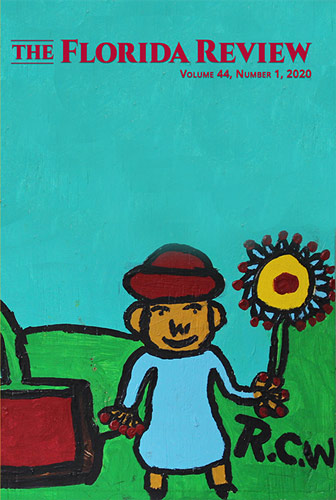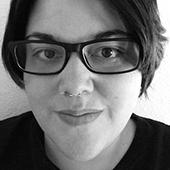The Florida Review – Winter 2008
Volume 33 Number 2
Winter 2008
Biannual
Sima Rabinowitz
In her entertaining and highly original Editors’ Note, Jocelyn Bartkevicius says at The Florida Review they’ve been “arguing over what counts as truth.” If names in the Table of Contents don’t make you eager to read the journal (Maureen P. Stanton, Baron Wormser, Tony Hoagland, Denise Duhamel, Michel Burkard, an interview with Terese Svoboda), the editor’s creative consideration of what constitutes fact checking, whether or not authors get to define the genres of their work, and the meaning of “truth” in these post James Frey Debacle times (as the Review’s staff refers to them) surely will.
In her entertaining and highly original Editors’ Note, Jocelyn Bartkevicius says at The Florida Review they’ve been “arguing over what counts as truth.” If names in the Table of Contents don’t make you eager to read the journal (Maureen P. Stanton, Baron Wormser, Tony Hoagland, Denise Duhamel, Michel Burkard, an interview with Terese Svoboda), the editor’s creative consideration of what constitutes fact checking, whether or not authors get to define the genres of their work, and the meaning of “truth” in these post James Frey Debacle times (as the Review’s staff refers to them) surely will.
Bartkevicius also contributes an interview with poet and fiction writer Terese Svoboda whose must read (and I mean this, it’s not-to-be-missed) book, Black Glasses Like Clark Kent: A GI’s Secret from Postwar Japan, won the Graywolf Press Nonfiction Prize. Bartkevicious is as good an interviewer as she is an editor, her questions are intelligent and provocative. She’s trying to find out what Svoboda knows, what she has to say, what she can learn from her. She’s not a fan gushing (like this reviewer!) or a novice writer wondering how she can replicate Svoboda’s success. And Svoboda is as good an interview subject as she is a writer.
Much of the truth-fact-fiction argument at the magazine revolved, apparently, around the magazine’s “graphic narrative” feature by Kelly Clancy, whose seven-page “comic strip” (my definition, not the editor’s) “Off the Bone” is, precisely, about “historical truth.” Clancy does a tremendous job of demonstrating the graphic narrative’s potential for condensing a lot of complex material into a very economical framework, with shifting tones and attitudes. Clancy makes this look easy, a sure sign that it isn’t.
The magazine’s nonfiction is particularly strong this issue, with essays by Steven Harvey on end-of-life issues for two and four-legged animals; Tracy Seely’s “Monument Rocks,” a “life geography” (my definition, not hers or the editor’s) in beautifully proportioned fragments; Maureen P. Stanton’s entertaining experience of the PBS favorite “Antiques Road Show”; and Baron Wormser’s rumination on the poetry of William Matthews.
This issue also includes the Editor’s Award winners: fiction by Julie Lekstrom Himes; nonfiction by Farnoosh Moshiri; and two poems by Maya Jewell Zeller. Alexis Levitin contributes translations from the Portuguese of poems by Rosa Alice Branco; and Mark Wisniewski, Kevin Allardice, Robin Kish, and Dawna Kemper contribute four stories, all with understated emotional truths.
Finally, if Denise Duhamel doesn’t make you glad for the inevitable blurring of lines between truth, fact, and fiction, nobody will; and as always, she’ll leave you breathless.
[www.floridareview.cah.ucf.edu/]


